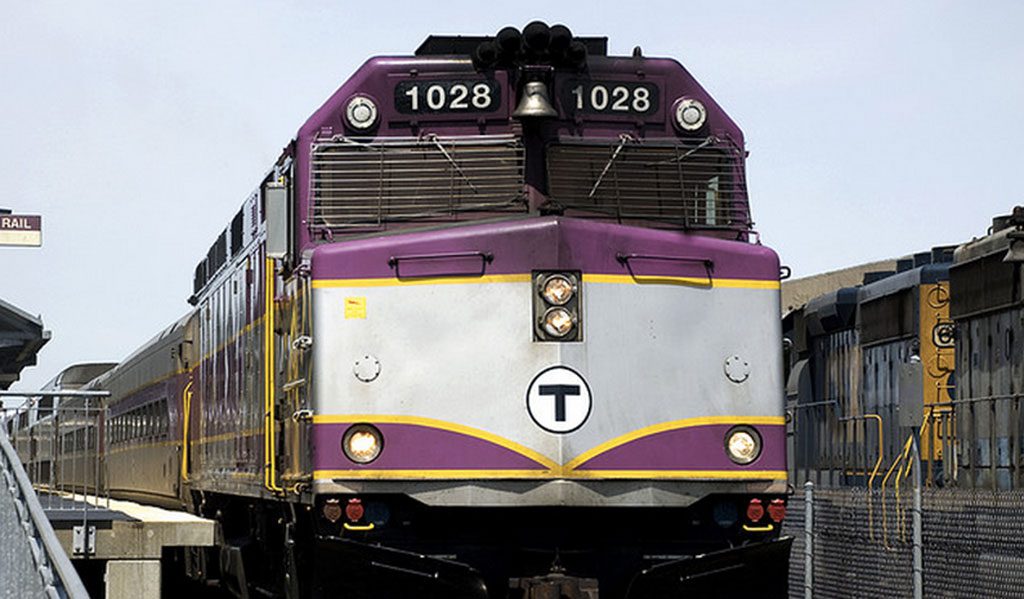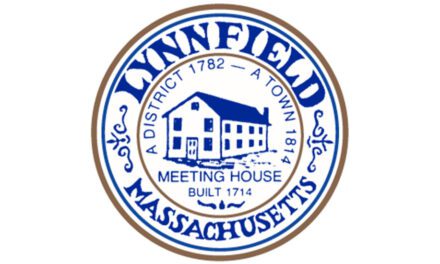By DAN TOMASELLO
LYNNFIELD — The MBTA Zoning Committee is reviewing five potential overlay districts to comply with the state-mandated multifamily zoning requirements law.
Former Gov. Charlie Baker signed an economic development bill into law in February 2021, which amended the state Zoning Act, by requiring MBTA Communities to have at least one zoning district of reasonable size in which multifamily housing is permitted as of right. While the town does not have an MBTA station, the law classifies Lynnfield as an “MBTA adjacent community” because the town borders municipalities with MBTA stations such as Lynn, Reading and Wakefield. The town is currently classified as being in “interim compliance.”
“We are holding this meeting so that the public can learn about this law and provide input,” said MBTA Zoning Committee/Planning Board Chair Page Wilkins during the Select Board’s meeting on Monday. “There is no building required with this law. We are not being told we have to build 607 units. No land is being taken by the state or the town to build anything. This is just a zoning amendment. We just have to create an amendment to our zoning that allows multifamily housing to be created in an area.”
Planning and Conservation Director Emilie Cademartori said five areas of South Lynnfield are tentatively being considered for an MBTA Communities overlay zoning district. She said the tentative locations are MarketStreet Lynnfield; Kimball Lane; the Michael’s Landing apartment complex, the old Christmas Tree Shops building and adjacent strip mall, gas station and storage facility on Route 1 South; Kelly Nissan, Kelly Jeep Chrysler, Herb Chambers Cadillac and the Lynnfield Commons apartment complex on Route 1 North; and a separate Route 1 North parcel by the Holiday Inn that is currently comprised of single-family homes and small businesses.
“We started with areas that were all developed,” said Cademartori. “We didn’t choose any raw land because there is almost no raw land left in Lynnfield. The reason why we are looking at South Lynnfield is because most of northern Lynnfield has been excluded by the state because of groundwater wells, and high-density housing is incompatible with the Groundwater Protection District. Almost all of the northern part of town has been excluded due to environmental restrictions.”
Barrett Consulting Group senior planner Sarah Maren, who is providing technical assistance to the MBTA Zoning Committee after the town was awarded a state grant, said the selected zoning district must be 40 acres in size and be able to accommodate 607 units.
“The district doesn’t have to be 40 acres next to each other,” said Maren. “You have the option to split smaller sites off of it or have it all be contiguous, but at least 20 acres has to be all-together.”
Maren said lawmakers approved and Baker signed the MBTA Communities Act into law three years ago in order to address the state’s housing crisis.
“You have probably heard talk about a housing crisis, low housing supply and rising costs,” said Maren. “The idea behind this law is to address that by stimulating supply.”
Maren said the town is facing a Dec. 31, 2024 deadline to adopt a multifamily zoning district in order to comply with the MBTA Communities law.
“In order to comply, you have to pass a district at Town Meeting and submit a compliance application to the state by Dec. 31, 2024,” said Maren. “Over 80 cities and towns have brought an MBTA Communities zoning district to a vote, and over 70 municipalities in Massachusetts have passed this zoning. Only about a dozen have shot it down at town meetings.”
If Lynnfield doesn’t comply with the MBTA Communities law by Dec. 31, Maren said the town will be not be eligible for state grants such as the Housing Choice Initiative, MassWorks and the Local Capital Projects Fund.
“There is significant ramifications with state funding tied to this,” said Maren.
Town Administrator Rob Dolan said the town has received $3.2 million in state grants the last several years, including a new $499,000 Complete Streets grant that will be overhauling the Salem and Summer streets intersection. He said the town also received a Complete Streets grant that made crosswalk improvements at both elementary schools and Lynnfield Middle School. He also said the town recently received a $250,000 Shared Streets and Spaces grant that will make improvements to the Town Common’s intersections by the Lynnfield Public Library.
Additionally, Dolan said the town has received $450,000 in grants from the Department of Conservation and Recreation’s MassTrails program for the rail trail project, which he said would not be moving forward without those grants. He said the “biggest grant” that Lynnfield has received was a $1,638,750 Municipal Vulnerability Preparedness (MVP) grant that was used to help fund the purchase of Lynnfield Woodlot, formerly known as Richardson Green, on upper Main Street.
“There are many issues to consider, but this is a pretty significant issue that needs to go into the debate,” said Dolan about the potential loss of state grants.
Citizens, officials displeased
Liberty Lane resident Anthony Leone said he is concerned that the only locations being considered for an MBTA Communities zoning district are in South Lynnfield. He said he strongly opposed the potential overlay zoning districts at MarketStreet and Kimball Lane.
“There are other parcels outside of South Lynnfield that can handle development,” said Leone. “It would be shortsighted to say if we zone it, a project will never be built. There will be a project built. It would exacerbate the already horrific traffic situation by introducing over 600 cars that would be screaming down Walnut Street and Salem Street, which already function as Lynnfield’s Autobahn.”
Leone also expressed concerns that an MBTA Communities zoning district would increase enrollment at Huckleberry Hill School.
“I believe it would be irresponsible to use a South Lynnfield site without a predetermined plan to equitably allocate students between Huckleberry Hill School and Summer Street School,” said Leone.
Townsend Road resident Mike Walsh, who is an attorney representing a group of Rockport residents challenging the legality of the MBTA Communities law, reiterated his opposition to it.
“Your planning staff has done an excellent job trying to minimize the impact on residential areas,” said Walsh. “But no one wants it in their backyard, so one of the things I am asking you to consider is to tell the state to go pound sand. Wakefield already has.”
Baldwin Lane resident Michele Cole said the MBTA Zoning Committee should include a School Committee representative because a multifamily housing district “could technically yield a lot of schoolchildren in town.” She also said she would be fine with the town losing state grants if Lynnfield rejects complying with the law.
MBTA Zoning Committee member Kate Flaws strongly disagreed with Cole.
“We wouldn’t just be losing grant money,” said Flaws, who also serves as the Planning Board’s vice chair. “We would also be losing services such as The Ride that takes a lot of our seniors to appointments and our Housing Authority would be losing money. It is fine if people end up opposing it, but I feel like the people opposing it have to figure out who is going to take people to their doctor’s appointments and how are we going to pay for things.”
Essex Village resident Helene Naimon said the MBTA Communities law “doesn’t make sense” because the town doesn’t have a train station. She also believes the law is unconstitutional.
MBTA Zoning Committee member Anthony Moccia, who is also chair of the Zoning Board of Appeals, recalled that Attorney General Andrea Campbell is suing the town of Milton for not complying with the MBTA Communities law. The case will be going before the Supreme Judicial Court in October.
“We are going to hear from the Supreme Judicial Court about the validity of the act in the next six months, but I don’t think anybody should assume this statute is going to be invalidated,” said Moccia. “I think it is a long shot. If we don’t comply, we are probably going to get sued.”
Naimon said the town should “fight” the state in court if Lynnfield gets sued.
“I think people need to realize that the state makes a lot of stupid decisions,” said Naimon.
Locksley Road resident Mary Lou Medonca said the town needs to adopt an MBTA Communities zoning district.
“The state does make a lot of stupid decisions, but so do towns,” said Medonca. “I think telling the state to go pound sand would be a big mistake. There is a lot to lose.”
Greenwood Road resident Stephanie Defilippo expressed concerns that a multifamily zoning district would increase traffic as well as costs associated with school enrollment and road construction in the future.
“We are talking about what we stand to lose for noncompliance right now,” said Cademartori in response. “Grants have and will continue to play an important role in our budget. Future infrastructure costs might be out there, but we have infrastructure costs now and we rely on these state funds now.”
Select Board member Phil Crawford thanked the MBTA Zoning Committee for “doing a great job” the last several months.
“I don’t think there is anyone in the room who is happy that this is being put upon us,” said Crawford. “No one wants to do this. We all want to see what happens with the lawsuit and the counterclaim, but we don’t have that luxury right now. We have to respond to it by the end of this year.”
MBTA Zoning Committee member Richard O’Neil, who also serves on the Board of Assessors, agreed.
“The last thing we want is having the state come in and mandate where it is going to be,” said O’Neil.
Select Board member Alexis Leahy urged the public to closely follow the MBTA Communities law discussion over the next several months.
The next MBTA Zoning Committee meeting will take place on Monday, Aug. 5. Cademartori encouraged residents to provide suggestions and feedback about potential locations for a zoning district.



